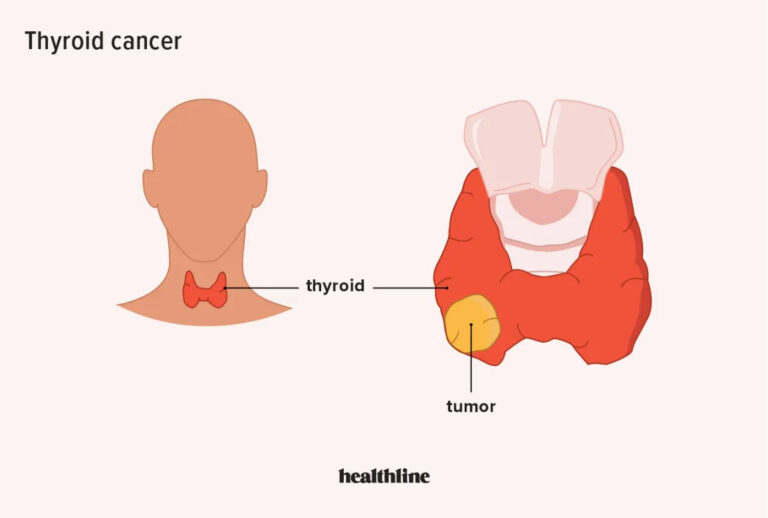The Basics Of Thyroid Tumors: What You Need To Know
Thyroid tumors, both benign and malignant, are becoming increasingly common in today’s medical landscape. Understanding the basics of thyroid tumors is crucial for early detection, effective treatment, and better prognosis. This article delves into what thyroid tumors are, their types, symptoms, diagnostic methods, treatment options, and preventive measures.
Understanding the Thyroid Gland
The thyroid gland is a butterfly-shaped organ located at the base of the neck, in front of the trachea. It plays a pivotal role in regulating the body’s metabolism, growth, and development through the production of thyroid hormones (thyroxine or T4 and triiodothyronine or T3). These hormones influence almost every cell in the body, controlling the rate at which cells use energy, produce proteins, and manage other hormones.
What Are Thyroid Tumors?
Thyroid tumors are abnormal growths of cells within the thyroid gland. These can be classified into two main categories: benign (non-cancerous) and malignant (cancerous).
1. Benign Thyroid Tumors: The most common type of benign thyroid tumor is a thyroid adenoma. These tumors can grow large and cause symptoms by pressing on nearby structures but do not spread to other parts of the body.
2. Malignant Thyroid Tumors (Thyroid Cancer): These tumors can invade nearby tissues and spread to other parts of the body. There are several types of thyroid cancer:
- Papillary Thyroid Cancer: The most common type, accounting for about 80% of cases. It grows slowly and is usually curable.
- Follicular Thyroid Cancer: Makes up about 10-15% of cases. It can spread to distant organs like the lungs or bones.
- Medullary Thyroid Cancer: Accounts for about 4% of cases and can be associated with genetic syndromes.
- Anaplastic Thyroid Cancer: A rare, aggressive form making up about 2% of cases. It has a bad prognosis and is hard to treat.
Symptoms of Thyroid Tumors
The symptoms of thyroid tumors can vary widely depending on the type and size of the tumor. Common symptoms include:
- A lump or swelling in the neck
- Difficulty swallowing or breathing
- Hoarseness or changes in the voice
- Persistent cough not related to a cold
- Pain in the neck or throat
- Swollen lymph nodes in the neck
It’s important to note that many thyroid tumors do not cause symptoms in their early stages, which can delay diagnosis and treatment.
Diagnostic Methods
Diagnosing thyroid tumors involves a combination of physical examinations, imaging tests, and biopsies. Key diagnostic methods include:
- Physical Examination: A doctor will check for lumps or swelling in the neck and evaluate the patient’s overall health.
- Blood Tests: These tests measure levels of thyroid hormones (T3 and T4) and thyroid-stimulating hormone (TSH) to assess thyroid function.
- Ultrasound: This imaging test uses sound waves to create pictures of the thyroid gland and can help identify the size, shape, and nature of the tumor.
- Fine-needle aspiration (FNA) Biopsy: Involves using a thin needle to remove a small sample of tissue from the tumor for microscopic examination. This is the most definitive method to determine if a tumor is benign or malignant.
- Radioactive Iodine Scan: This test uses a small amount of radioactive iodine to assess thyroid function and detect abnormalities.
- CT or MRI Scans: These imaging tests provide detailed pictures of the thyroid and surrounding areas, helping to determine if the cancer has spread.
Treatment Options
The treatment of thyroid tumors depends on whether the tumor is benign or malignant, its size, and whether it has spread. Common treatment options include:
- Watchful Waiting: For small, benign tumors that do not cause symptoms, doctors may recommend regular monitoring instead of immediate treatment.
- Surgery: The primary treatment for thyroid cancer is the surgical removal of part or all of the thyroid gland (thyroidectomy). If the malignancy has spread, removal of the neck lymph nodes may also be necessary.
- Radioactive Iodine Therapy: Used to destroy any remaining thyroid tissue after surgery or to treat thyroid cancer that has spread to other parts of the body.
- External Beam Radiation Therapy: Involves using high-energy rays to target and kill cancer cells. This is less commonly used but may be necessary for certain types of thyroid cancer.
- Thyroid Hormone Therapy: After thyroidectomy, patients often need to take thyroid hormone pills to replace the hormones that the thyroid gland would normally produce and to suppress the growth of any remaining cancer cells.
- Chemotherapy: Used in rare cases where thyroid cancer does not respond to other treatments. It involves using drugs to kill cancer cells.
- Targeted Therapy: Uses drugs that specifically target cancer cells without affecting normal cells. This is an emerging treatment option for advanced thyroid cancers.
Preventive Measures
While it is not always possible to prevent thyroid tumors, certain measures can reduce the risk:
- Regular Check-ups: Routine medical exams can help detect thyroid abnormalities early.
- Adequate Iodine Intake: Iodine is essential for thyroid function. Ensuring sufficient iodine intake through diet or supplements can help maintain thyroid health.
- Avoiding Radiation Exposure: Limiting exposure to radiation, especially during childhood, can reduce the risk of developing thyroid cancer.
- Genetic Counseling and Testing: For individuals with a family history of thyroid cancer or related genetic syndromes, genetic counseling and testing can help assess risk and guide preventive measures.
Living with Thyroid Tumors
A diagnosis of a thyroid tumor can be daunting, but many patients lead normal, healthy lives with proper treatment and management. Regular follow-ups, medication adherence, and lifestyle adjustments are crucial. Patients should work closely with their healthcare team to monitor their condition and adjust treatment as needed.
Conclusion
Thyroid tumors, while often asymptomatic in the early stages, can significantly impact health if left untreated. Understanding the basics of thyroid tumors—recognizing symptoms, undergoing appropriate diagnostic tests, and pursuing effective treatments—can improve outcomes and enhance quality of life. As research advances, new diagnostic tools and treatments continue to emerge, offering hope for better management and potential cures for thyroid tumors. Regular medical check-ups and a proactive approach to thyroid health are essential for early detection and successful treatment.








